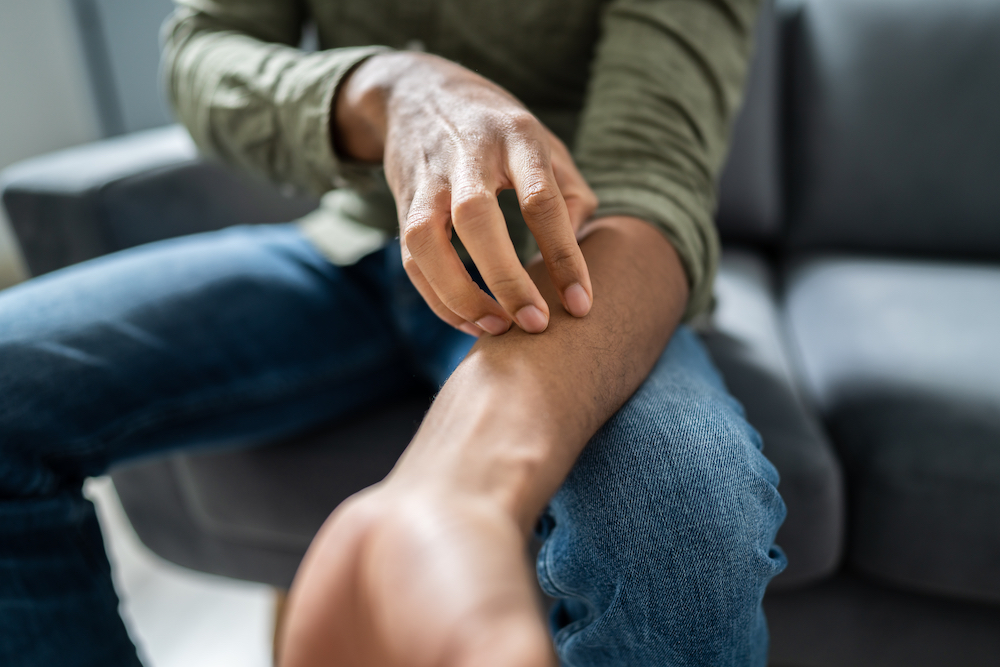3 Things to Know About Eczema

Eczema is a common skin condition, but that does not make dealing with the symptoms any easier. According to the National Eczema Association, over 10% of people in the United States have some form of eczema. The condition can also affect people of all skin tones. Although eczema can be frustrating, the good news is that there are effective treatments available to help you manage your skin and minimize outbreaks.
Like anything related to the skin, educating yourself and seeking help from a board-certified dermatologist can allow you to actively manage the condition and reduce the most irritating symptoms.
In this article, Dr. Straughn will share 3 things that you should know if you have eczema. After reading this, call the offices of Buckhead Dermatology in Atlanta or College Park to schedule an appointment to learn even more about eczema and how to safely and effectively treat your skin.
3 Things to Know About Eczema
Not all eczema is the same.
Just like many people refer to all tissues as Kleenex, eczema is a term that is frequently used to describe a number of different skin conditions. There are 7 different types of eczema, and it is important to obtain an accurate diagnose of which kind you are experiencing before starting any kind of treatment. And while you can get a lot of information on the internet, you should always visit your dermatologist to diagnose a skin condition.
Doctors have identified these types of eczema:
Atopic Dermatitis:
- Most common form of eczema
- Flare-ups common on face, arms and legs
- Often found in children
- Symptoms include itchiness, redness and inflammation
Contact Dermatitis:
- Triggered by contact with an allergen or irritant
- Similar symptoms as atopic dermatitis
Neurodermatitis:
- Usually confined to 1-2 patches
- Characterized by intense itching
- Most common in adults, specifically women
- Triggered by stress, tight fabrics or psoriasis
Dyshidrotic Dermatitis:
- Commonly appears on hands and feet
- Triggered by allergens in the springtime
Nummular Dermatitis:
- Small, coin-shaped patches
- Can vary in appearance and location
Seborrheic Dermatitis:
- Chronic condition, often appears in infants as cradle cap
- Flare-ups occur near sebaceous glands
Stasis Dermatitis:
- Caused by circulation issues
- Commonly found in the lower legs
- Symptoms include itchiness and swelling
It is important to understand your triggers.
Much to the chagrin of those who have eczema, there is not one specific cause of the condition. In addition to genetics, external factors are the best way to identify how to manage your eczema. The symptoms that present are usually how your doctor will diagnose the condition. Oftentimes, patients are asked to keep a log of their flare-ups and record possible triggers. This information is vital for your doctor to be able to give you an accurate diagnosis.
Some of the most common triggers of eczema include:
- Irritants (chemicals, fragrances in lotions and cosmetics, cleaning products)
- Stress (increases in cortisol levels can trigger a flare-up)
- Very hot or cold conditions
- Hormonal fluctuations
- Allergic reactions to pollen, poison ivy or other environmental factors
- New foods or beverages
Eczema can be managed.
There is no cure for eczema. Management of the condition relies on identifying and avoiding your triggers and treating the symptoms of the flare-ups. If you have identified your triggers, avoid those things whenever possible. Avoid extremes in temperature, including hot baths and showers. Use skin care products that are meant for sensitive skin and be sure to keep your skin moisturized.
There are over-the-counter medications that can address itchiness and irritation. Your dermatologist may also prescribe oral medications to address certain symptoms.
Leading Eczema Dermatologist Atlanta
While frustrating, your eczema can be managed with the help of a dermatologist. Dr. Straughn at Buckhead Dermatology has been helping patients manage their eczema for over 25 years. If you are ready to achieve healthy skin and minimize the appearance of your eczema, call the office to schedule your appointment today.
We have offices at two convenient locations in Atlanta and College Park. We look forward to helping you get the skin you want!
